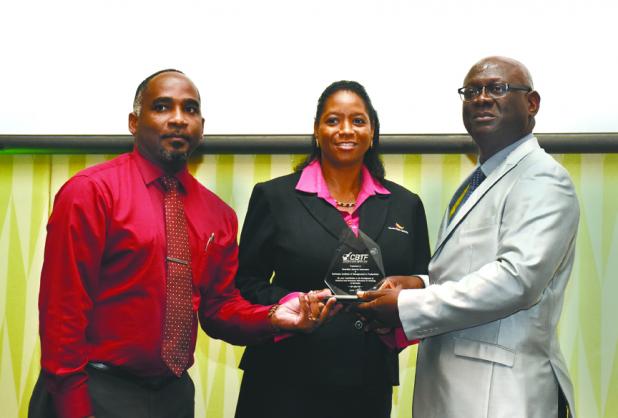
Consultancy Manager with the Competency-Based Training Fund (CBTF), K. Anderson Lowe (right), presenting Managing Director of AC Manufacturing, Cheryl Stoute (centre), with a trophy for participating in the programme. Also in the photo is Principal of the Samuel Jackman Prescod Polytechnic (SJPP), Hector Belle.
30 proposals funded
To date, 30 proposals through the Inter-American Development Bank (IDB) funded Competency-Based Training Fund (CBTF) – spanning 16 economic sectors and 25 new programmes – have been financed with contributions from the private sector.
That is according to the Barbados Country Representative for the IDB, Juan Carlos De la Hoz Vinas, who delivered greetings at the CBTF Class of 2017 Graduation Ceremony recently at the Hilton Barbados Resort.
He said that the CBTF initiative was formed three years ago with the objective of developing partnerships between training institutions and various organisations within the private sector that would lead to a more skilled workforce.
“The CBTF programme was launched during a conference in January 2014 entitled ‘Skills for the Future – Build, Innovate, Transform’, which had the objectives of building partnerships between the private sector and training institutions and developing innovative ways to provide training that would transform the delivery of technical and vocational education.”
At the time of the conference it was decided by those who were in attendance that the training programmes that were funded under this initiative would be those where businesses would be in a position to voice what areas they wanted the training programme to include.
Meanwhile the CBTF has their own criteria in mind. “All participants of that conference, especially the representatives of the private sector, emphasized that close partnerships between businesses and training institutions are necessary and that businesses should play a key role in the definition of training content to ensure that vocational and technical training is both relevant and of good quality. The CBTF responds to these needs by focusing on four key requirements: 1) Training has to be competency based; 2) Training has to result in a certificate for the trainee such as a Caribbean Vocational Qualification or a National Vocational Qualification; 3) Proposals are to be submitted on a competitive basis and 4) Most importantly, training proposals had to be submitted by a partnership between a business and training provider.”
De la Hoz Vinas stated that 61 per cent of 4 160 persons have been trained so far, 30 per cent of whom have been certified.
“Given that this was something that had never been tried before, both the Bank and the Government went into this venture with carefully managed expectations. Today, we are pleased to celebrate with the graduates of this programme as you are living proof that this was a risk worth taking. To date, the CBTF has received 138 submissions in four different calls for proposals. Thirty proposals have been funded, representing 16 economic sectors and 25 new programmes have been defined with the input from the private sector. The approved proposals aimed to train a total of 4 160 persons. To date 61 per cent have been trained and 30 per cent have been certified.”
